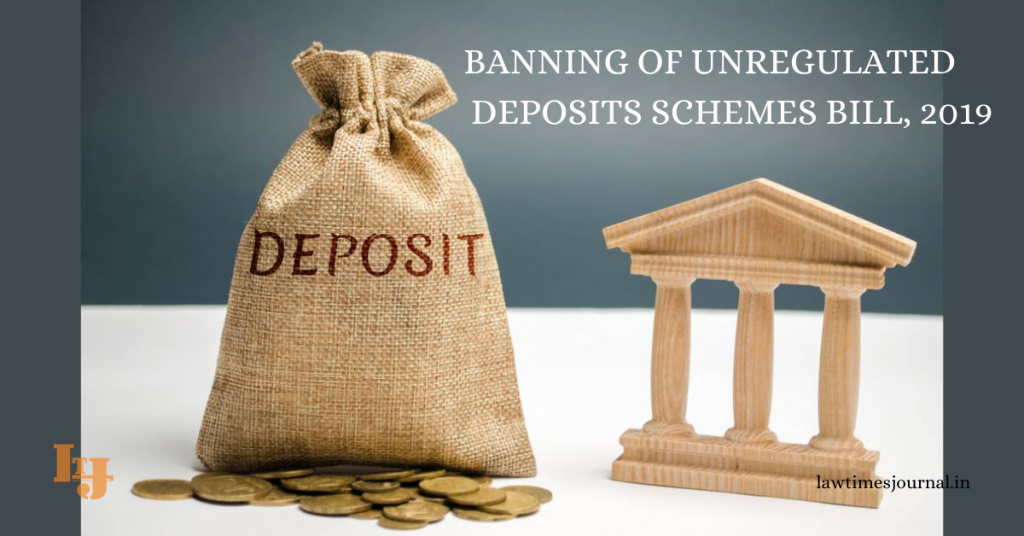The Banning of Unregulated Deposit Schemes Bill, 2019 was passed by the Lok Sabha on 13.02.2019 but could not be passed by the Rajya Sabha. Since the Parliament is not in session, the BANNING OF UNREGULATED DEPOSIT SCHEMES ORDINANCE, 2019 has been issued by the President of India vide Notification dt. 21.02.2019. According to Article 123 of the Constitution, the President have power to promulgate Ordinances during recess of Parliament.
It is noteworthy to understand the difference between ‘Act’ and ‘Ordinance’. Act is law which is passed by parliament and has also received the assent of president and is in force. An ordinance is also a ‘Law’ but without being subject to the discussion and deliberation in both or one of the houses of the Parliament. The President, subject to conditions as specified in Article 123 of Constitution, may in consultation with the Cabinet, pass a law in the form of Ordinance. Ordinance is temporary law till its expiry or till it is repealed or till it is approved by the legislature.
Objective:
The Ordinance is to provide for a comprehensive mechanism to ban Unregulated Deposit Schemes and to protect the interest of the depositors and for matters connected therewith. It aims to prevent such unregulated deposit schemes or arrangements at their inception and at the same time makes soliciting, inviting or accepting deposits pursuant to an unregulated deposited scheme as a punishable offence.
Contrary to initial apprehensions, individuals taking loans from relatives or friends for business or for other personal reasons, will not be affected
The recently-promulgated Banning of Unregulated Deposit Schemes Ordinance 2019 ruffled a few feathers with news reports and legal experts expressing concerns over how the ordinance could hurt individuals who raise quick loans from relatives or friends, and businesses taking loans from unrelated parties and enterprises.
A series of tweets by the Finance Ministry last week, along with specific clarifications issued on individuals borrowing from friends and relatives, have allayed some of the concerns.
We break down the various provisions and exclusions of the ordinance to explain how it will have an impact on individuals and businesses.
The intent of the ordinance is to check illicit deposit/ponzi schemes that hurt small investors.
But the words used to describe some of the exclusions, as laid down in Section 2 (4) of the ordinance, kept individuals and businesses on tenterhooks.
The ordinance states that any deposit scheme under which deposits are accepted or solicited by any deposit-taker by way of business, which is not a regulated deposit scheme, is banned.
Deposit in the ordinance has been defined as “an amount of money received by way of advance or loan in any other form by any deposit-taker with a promise to return whether after a specified period or otherwise either in cash or in kind in the form of a specified service with or without any benefit in the form of interest, bonus, profit or in any other form”.
There are several exclusions in the ordinance on what is not a ‘deposit’. Varying interpretations by legal experts have led to confusion.
Individuals
For instance, while amounts received by an individual by way of loan from his relatives are excluded, under Section 2 (4) (f), there was ambiguity over whether relatives only included immediate family, and not friends and far-off relations.
But the ministry has now clarified that “individuals borrowing or taking loans or money from relatives or friends for marriage or medical emergency or business needs or any other personal reasons have nothing to fear.
Such transactions are not unregulated deposit schemes as defined in Section 2 (17)”.
lso, an individual can receive money from a friend residing abroad, subject, of course, to the provisions of FEMA.
Bottomline: As far as individuals are concerned, they can borrow money from relatives or friends for any purpose – business or personal – as per the ministry’s clarification.
Partnerships
There have been several debates by legal experts, which may need more clarification.
Under Section 2 (4) (e), any amount received by way of contributions towards capital by partners of any partnership firm is excluded from the definition of ‘deposit’, implying that such amounts are allowed and do not attract penal provisions under the ordinance.
Also as per Section 2 (4) (f), amounts received by a firm by way of loan from relatives of any of the partners is excluded from the definition of ‘unregulated deposits’ and is hence, allowed.
But there is uncertainty over the money received from a partner as ‘loan’. Here, the government will have to issue further clarification.
Bottomline: As the current provisions read, there is uncertainty over whether a partnership firm can receive money from its partner which is other than capital contribution. Any amount received from a partner’s friend is not allowed.
Companies
The other concern is whether businesses can take unsecured loans from unrelated entities and parties. But Section 2 (4) (l) excludes amount received for the purpose of business, which clearly implies that businesses can take unsecured loans from unrelated parties and enterprises. The ministry has, however, specifically clarified this point by stating that “small businesses, proprietorships, partnerships, LLPs and SMEs that take unsecured loans from unrelated parties and enterprises are also exempt under Section 2 (4) (I) of the law”.
Bottomline: There is no ban on small businesses receiving loans in the course of or for business purposes.
Hence the salient features can be outlined as:-
- It extends to the whole of India except J& K… It shall be regulated by the concerning StateGovernments/UTs…
- It shall come into force with the immediate effect…
- It is aimed only to ban Unregulated Deposit Schemes…
- Deposit would NOT include
- loan from scheduled banks or Co- operative Banks;
- loan from Public Financial Institutions;
- loan from Government;
- Loans from foreign Banks or foreign Governments;
- partners’ capital;
- amount payable on purchase of any goods or immovable property and very importantly;
- any amount received genuinely, in the course of or for the purpose of business.
Thus, the loans taken during the course of business are not covered by this Ordinance.
- It will apply only and only with prospective effect* and that too *in respect of deposits taken under the Unregulated Deposit Schemes either by way of advertisement or otherwise.
- The Government shall appoint an authority and Designated Court. The details of deposits taken would be required to be furnished in the Court shall be competent to attach the properties acquired through such Unregulated Deposit.
- Any violation may attract imprisonment for a term of 1 to 10 years with fine.
- it’s not making restrictions on taking loans by all business entities. Restriction is only on taking deposits directly or indirectly in name of business in pursuance of a deposit scheme which is not regulated.
- Companies can accept deposits as per s. 73 to 76 of Companies Act, 1956 read with Companies (Acceptance of Deposit) Rules 2014.
- Others including partnerships, proprietorships, LLP, etc. cannot accept deposits per se, but take loans from their relatives, friends, banks, companies, etc. for the purpose of their business but not for further lending (which is restricted as per RBI regulations too)
- The purpose of this scheme seems to be to ban persons taking/accepting money/ deposits by frivolous means including MLM, prize chit or money circulation schemes.
The author is Chartered Accountant and can be reached at rsc@carajnish.in


